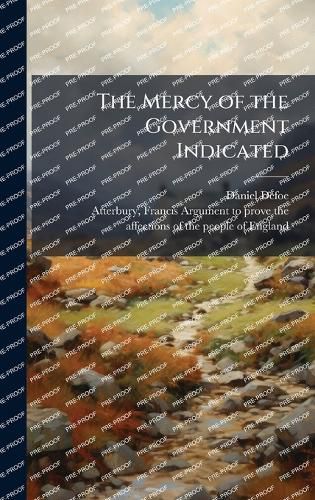Readings Newsletter
Become a Readings Member to make your shopping experience even easier.
Sign in or sign up for free!
You’re not far away from qualifying for FREE standard shipping within Australia
You’ve qualified for FREE standard shipping within Australia
The cart is loading…






"The Mercy of the Government Indicated" is a significant political pamphlet attributed to Daniel Defoe, published in 1716. This work engages with the pressing issues of governance and public sentiment in early 18th-century England. The pamphlet includes remarks upon a late pamphlet entituled 'An Argument To Prove the Affections of the People the Best Security of the Government', reflecting Defoe's keen interest in contemporary political debates.
Defoe's insightful analysis offers a valuable window into the political landscape of the time, exploring themes of governmental legitimacy and the role of public opinion. This historical document is essential for scholars and readers interested in political theory, British history, and the works of Daniel Defoe. The work provides context into the often turbulent political climate of the early Hanoverian period.
This work has been selected by scholars as being culturally important, and is part of the knowledge base of civilization as we know it. This work was reproduced from the original artifact, and remains as true to the original work as possible. Therefore, you will see the original copyright references, library stamps (as most of these works have been housed in our most important libraries around the world), and other notations in the work.
This work is in the public domain in the United States of America, and possibly other nations. Within the United States, you may freely copy and distribute this work, as no entity (individual or corporate) has a copyright on the body of the work.
As a reproduction of a historical artifact, this work may contain missing or blurred pages, poor pictures, errant marks, etc. Scholars believe, and we concur, that this work is important enough to be preserved, reproduced, and made generally available to the public. We appreciate your support of the preservation process, and thank you for being an important part of keeping this knowledge alive and relevant.
$9.00 standard shipping within Australia
FREE standard shipping within Australia for orders over $100.00
Express & International shipping calculated at checkout
"The Mercy of the Government Indicated" is a significant political pamphlet attributed to Daniel Defoe, published in 1716. This work engages with the pressing issues of governance and public sentiment in early 18th-century England. The pamphlet includes remarks upon a late pamphlet entituled 'An Argument To Prove the Affections of the People the Best Security of the Government', reflecting Defoe's keen interest in contemporary political debates.
Defoe's insightful analysis offers a valuable window into the political landscape of the time, exploring themes of governmental legitimacy and the role of public opinion. This historical document is essential for scholars and readers interested in political theory, British history, and the works of Daniel Defoe. The work provides context into the often turbulent political climate of the early Hanoverian period.
This work has been selected by scholars as being culturally important, and is part of the knowledge base of civilization as we know it. This work was reproduced from the original artifact, and remains as true to the original work as possible. Therefore, you will see the original copyright references, library stamps (as most of these works have been housed in our most important libraries around the world), and other notations in the work.
This work is in the public domain in the United States of America, and possibly other nations. Within the United States, you may freely copy and distribute this work, as no entity (individual or corporate) has a copyright on the body of the work.
As a reproduction of a historical artifact, this work may contain missing or blurred pages, poor pictures, errant marks, etc. Scholars believe, and we concur, that this work is important enough to be preserved, reproduced, and made generally available to the public. We appreciate your support of the preservation process, and thank you for being an important part of keeping this knowledge alive and relevant.